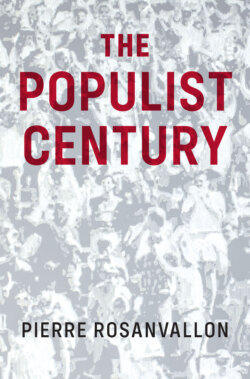Читать книгу The Populist Century - Pierre Rosanvallon - Страница 13
1 A CONCEPTION OF “THE PEOPLE”: THE PEOPLE AS ONE BODY
ОглавлениеOne common feature of populist movements is that they establish the people as the central figure of democracy. Some will call this a tautology, given that the demos is sovereign by definition in a type of regime whose name itself refers to the demos. And every good democrat is necessarily a populist, in this very general sense. But the self-evident statement is as fuzzy in practical terms as it seems to be imperative conceptually. Who is in fact this governing people? The question never fails to come up. From the outset, it has been invoked in endless oscillation between a reference to the people as a civic body, a figure of political generality expressing unity, and reference to the people as a social group, a figure conflated de facto with a specific segment of the population. When the Americans began the preamble to their Constitution in 1787 with the words “We the People,” they were using the term in the first sense. It was in that sense, too, that the French revolutionaries consistently linked references to the people with references to the nation (a term that referred explicitly, for its part, only to a historical and political notion). This people stemmed from a constitutional principle or from a political philosophy before it had any concrete existence (moreover, when it did come into being, it took the reduced form of a rarely unanimous electoral body). But in 1789, when one spoke about the people who had stormed the Bastille, the reference was also to a crowd that had a face – as did the crowd that gathered in 1791 on the Champ-de-Mars to celebrate the Federation, and the crowds that erected the barricades in 1830 or 1848. The people existed, in these cases, in the form of specific manifestations. The people to whom Jules Michelet or Victor Hugo referred had a perceptible consistency: they were les petites gens, the bottom layers of society (those featured by Hugo as “the wretched” in his novel Les Misérables). In this case, one could speak of a “social people,” the people as a specific social group. It was imperative to tell this people’s story, to bring it to the fore, in order to constitute it and pay it homage through the representation of particular existences. A more sociological approach gradually took hold and defined the contours of this people. The social people then took on the name proletariat, working class, or “popular classes” (the plural taking into account the complexity of social structures). The language of class thus gave the term “people” a particular meaning. But this reduction in scope was corrected by a statistical fact, namely, the numerical preponderance of a world of workers that had its own pronounced identity – further complicated by the fact that Marxism saw the working class as the forerunner of a new universalism: the classless society.
Although these two peoples, the people as a social group and the people as a civic body, did not coincide, they were nevertheless inscribed in a common narrative and a common vision, that of achieving a democracy understood simultaneously as a governing regime and as a form of society. The prospect of such an achievement dimmed at the turn of the twenty-first century, in two ways. First, electoral bodies have suffered a certain atrophy: a growing rate of voter abstention expresses both the rejection of traditional parties and the feeling of being poorly represented. This atrophy can be seen in the decline in voter turnout, that is, in the democratic exercise of expressing one’s opinion at the ballot box.1 Next, in sociological terms, societies have been affected by increasing individualization as well as by the transformation of living and working conditions that has shaped unprecedented modalities of exploitation, relegation, and domination. These insufficiently studied upheavals have reinforced feelings of inadequate representation and invisibility for a growing part of the population in most countries. Under such conditions, “the people” has become “unlocatable.”2 It is in this context that the populist notion of the people has been forged, proposing a purportedly more appropriate evocation of the present and embedding itself within a perspective intended to mobilize a refounding of democracy.
